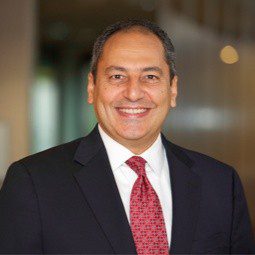Government contractor Suntiva is built on integrating a unique blend of expertise in technology, business process and workforce planning into innovative solutions to help government leaders transform their organizations. Suntiva is a perfect reflection of Dr. Hany Malik’s own professional background combining a career of IT and management consulting for a Fortune 500 company for many years with a doctorate degree in psychology.
In an interview with WashingtonExec, Dr. Malik joins Mark Day, vice president of Suntiva, to share their thoughts about transformation, Suntiva’s approach and solutions and how “people” is a major link often overlooked in successful organizational or government transformation initiatives.
WashingtonExec: What’s the best use case of government transformation you’ve had in the last couple of years with one of your clients?

Day: We were engaged by an agency that had a very large IT effort. The system that we were asked to engage on had failed so badly that the agency had stopped all deployment, stopped any state from using it and had halted millions of dollars in investment. As you can imagine, there was quite a fight between the vendor, the state and the federal agency. We were able to uncover not only the symptoms but also the root of the problems, that in fact all three parties owned a part of the problem.
We ended up having to take on workforce work, coaching, facilitation, strategic communications, and help the parties understand the results we found, understand how to adopt new business processes and provide a transparency between the partners so they could all understand the root causes of the problems they were facing both on a technology level and in the people and the process areas. That system today is up and running. We continue to be engaged there because of our ability to bring the three perspectives together.
WashingtonExec: What’s been your experience with your adoption management approach?
Day: Adoption management is all about removing and reducing risk from people resisting change to a project. We spend a lot of money getting the technology right, on agile adoption, things like TenBlock adoption. But in fact, we often do not have effective ways of addressing the people part of that project. What we’ve done is bring those things together. We’ve developed a proprietary methodology that combines the best of TenBlock; something called the ADKAR Change Management Methodology. We put those two things together with certified IT staff who know things like agile and lean six, so that when we bring change management to a major project, we understand the change management in the environment in which it’s occurred.
The person we bring to a change management project, say, a major IT project, understands both how the projects get de-railed by misalignment with people and we bring the toolkit for the project manager to get the communications right — to get the right training in place, to help coach them through dealing with difficult partners.
WashingtonExec: How do you see the role of coaching in supporting organization transformation efforts?”

Dr. Malik: We view coaching as one of the important tools in our methodology for supporting organization transformation initiatives in the government. I’m also a faculty member of the Georgetown University Leadership Coaching Program and I wanted to develop a unique coaching offering. These are nontraditional ways of coaching, but consistent with our methodology. I was able to take advantage of our capabilities and draw up on the deep and diverse experience of other staff members of Suntiva in those other areas. Our clients absolutely value our ability to do that because they know that they get a more complete solution to their challenges. Change management gives our coaches the necessary skills not just to say the needed things to be heard by the executive but also how to say it and when to say it.
Day: Every coach here is certified, and they have deep experience in executive and leadership roles. They are coaches who have lived the challenges their clients face and so they’re able to have a deep empathy of and a true understanding for the problems and circumstances their clients are facing.
WashingtonExec: How do you bring your expertise to your own employees and company culture? How do you approach transformation internally, including working with millennials in the workforce?
Dr. Malik: Just as I had the fortune of coming to this line of work from multiple professional backgrounds, we very much value the power of creating multidisciplinary teams from diverse IT, business process and human capital backgrounds and putting them in service to solving our clients’ most vexing challenges. Our culture of extreme collaboration also allows us to use the same brilliant brains and the same transformation methodology we use with our clients internally in transforming our company. I am proud to say that we “walk the transformation talk” and that we have collectively succeeded in transforming our company to the first class government contractor and the “Great Place To Work” that we are today.

